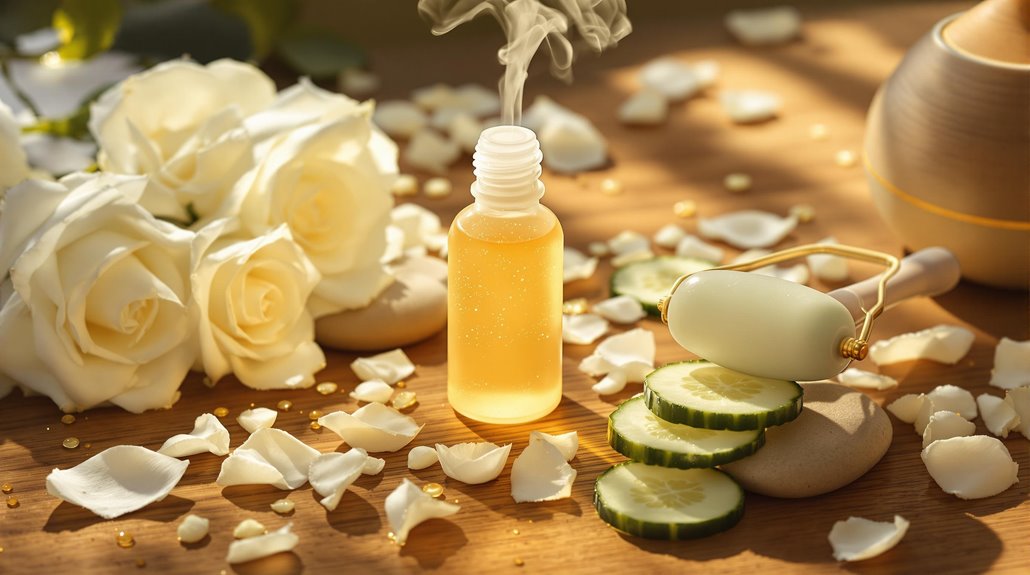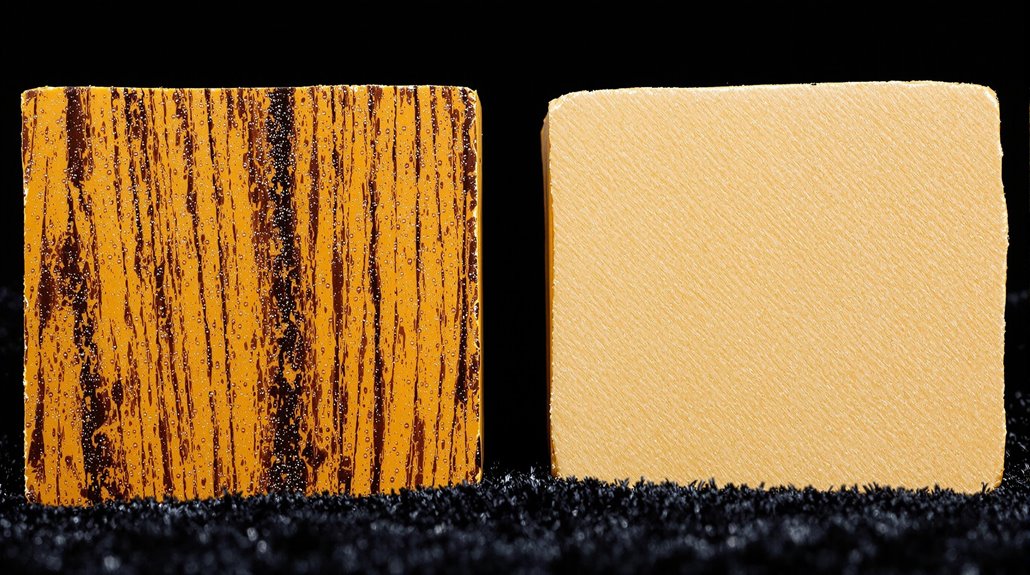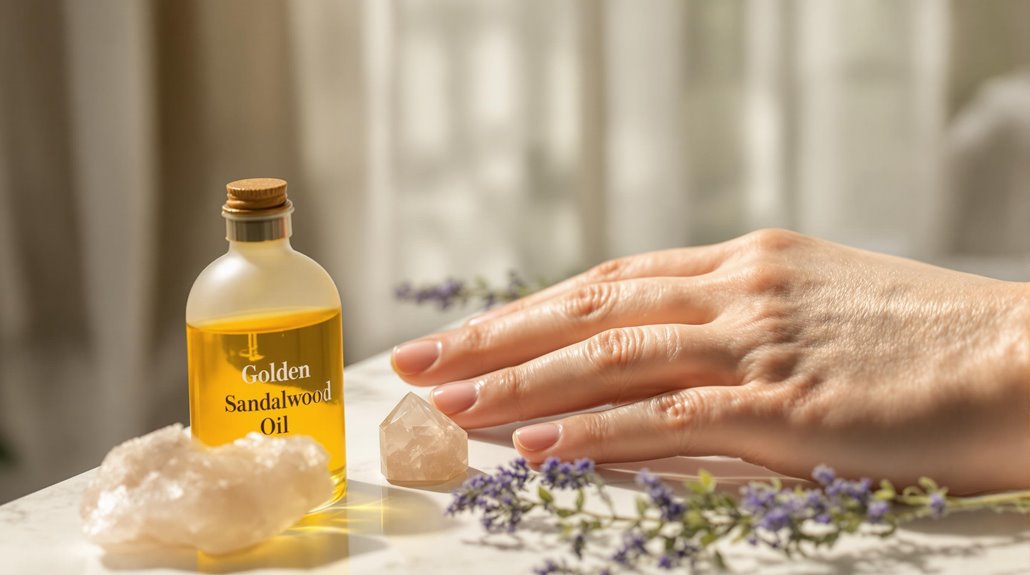Why Sandalwood Oil Is Amazing for Hair Health

You'll find sandalwood oil to be a powerful natural solution for healthier hair and scalp. It directly stimulates hair growth by augmenting keratinocyte production, which increases keratin - your hair's building block. Scientific research shows it can trigger new hair growth in just six days. When combined with carrier oils like coconut oil, sandalwood's anti-inflammatory and antibacterial properties help combat dandruff while deeply moisturizing your scalp. It's also effective at soothing irritation and regulating sebum production, leading to stronger, shinier hair.
The secrets to maximizing sandalwood oil's benefits lie in proper application and essential mixing techniques.
Understanding Sandalwood Oil's Hair Benefits
Ever wonder why sandalwood oil has become increasingly popular in hair care products? Scientific research, including a notable study from the University of Manchester, has shown that this extraordinary oil effectively stimulates hair growth through a fascinating biological process. When you apply sandalwood oil to your scalp, it promotes the production of keratinocytes - the critical cells responsible for creating keratin, your hair's primary building block.
But that's not all you'll get from adding sandalwood oil to your hair care routine. Its powerful anti-inflammatory properties work to soothe your scalp, while its natural antibacterial qualities help combat and prevent dandruff. When combined with other nourishing ingredients like argan oil, sandalwood oil delivers deep moisturization to your hair strands, leaving them softer and more manageable.
You'll find these benefits expertly utilized in products like Ayumi's BioActive Growth Hair Oil and their Argan & Sandalwood Hair Conditioner. These formulations take advantage of sandalwood oil's unique ability to improve both scalp health and hair growth, making it a beneficial addition to any comprehensive hair care regimen.
Scientific Research Behind Hair Growth
Innovative research has revealed the science behind sandalwood oil's exceptional effects on hair growth. Scientists at the Monasterium Laboratory in Münster, Germany, made an unprecedented discovery when they observed new hair growth on scalp tissue samples after just six days of sandalwood oil application. This finding has transformed our understanding of how this natural ingredient promotes hair health.
The key to sandalwood oil's effectiveness lies in its ability to stimulate keratinocytes, the cells responsible for producing keratin in your scalp tissue. When you apply products containing sandalwood or its derivative compound Sandalore, these cells multiply more rapidly, leading to increased keratin production. The University of Manchester's research has further validated these findings, confirming that sandalwood effectively promotes keratinocyte proliferation.
What's particularly exciting about this research is that it's not just theoretical - the results are measurable and occur within a remarkably short timeframe. The studies show that the compound Sandalore begins enhancing keratin production in human scalp tissue after only six days, demonstrating why sandalwood oil has become such a promising ingredient for hair growth treatments.
Natural Treatment for Scalp Issues
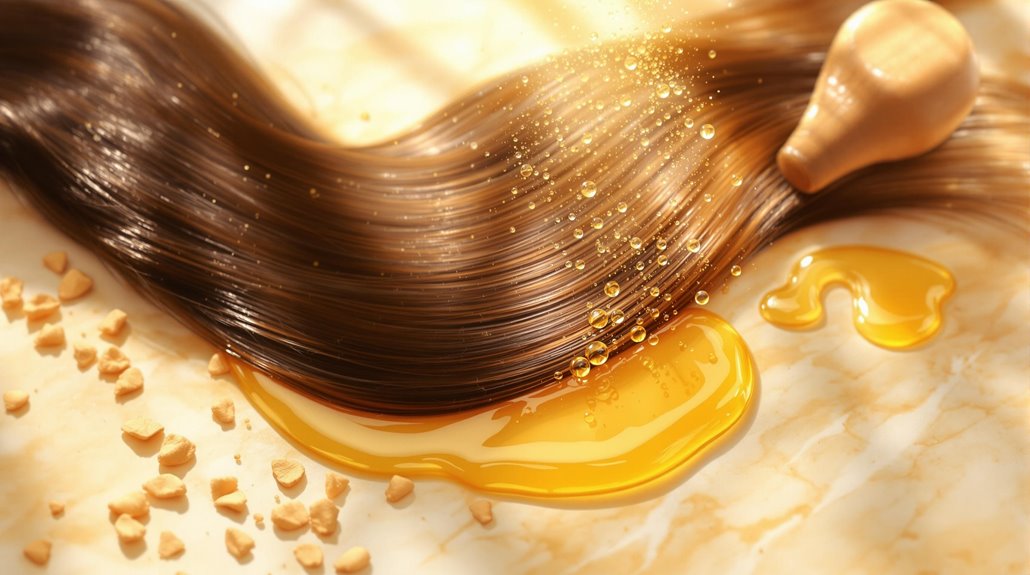
Sandalwood oil steps up as a powerful natural solution for common scalp problems, thanks to its impressive anti-inflammatory and antimicrobial properties. When you're dealing with persistent scalp issues like dandruff or irritation, this natural remedy offers multifaceted relief through its unique combination of antiseptic and antibacterial qualities.
- Combats dandruff and flaking by regulating sebum production
- Soothes inflamed scalp conditions with cooling properties
- Fights bacterial and fungal infections naturally
- Strengthens hair roots while treating scalp issues
- Adds shine and improves hair texture during treatment
You'll find that sandalwood oil's comprehensive approach targets both the symptoms and root causes of scalp problems. Its anti-inflammatory properties calm irritated skin, while its antiseptic nature creates an environment where harmful bacteria can't thrive. The oil's ability to regulate sebum production helps maintain optimal scalp moisture, preventing both dryness and excess oiliness that often lead to dandruff. As an added benefit, while treating these scalp issues, you're also strengthening your hair roots and improving overall hair health. The antioxidants in sandalwood oil work to protect your scalp while simultaneously enhancing your hair's natural shine and texture.
Mixing Sandalwood Oil Hair Recipes
Creating effective hair treatments with sandalwood oil starts with understanding the right proportions and complementary ingredients. You'll find that combining sandalwood oil with virgin coconut oil creates a potent massage oil that can stimulate hair growth and improve scalp health. For a simple yet effective formula, mix 8 drops of sandalwood oil with one bowl of coconut oil.
If you're looking for a more intensive treatment, you can make a strengthening hair cream by combining natural ingredients. Mix 1 tablespoon of beeswax with 2 tablespoons each of virgin coconut oil and shea butter, then add 10 drops of sandalwood oil. This formulation creates a nourishing cream that targets weak hair follicles and adds noticeable volume to your hair.
What makes these recipes particularly effective is sandalwood oil's natural anti-inflammatory and antimicrobial properties. When you massage these mixtures into your scalp, they'll help improve blood circulation while fighting off harmful bacteria. Whether you choose the simple massage oil or the more complex hair cream, you'll be giving your hair the natural care it needs to grow stronger and healthier.
Best Application Methods
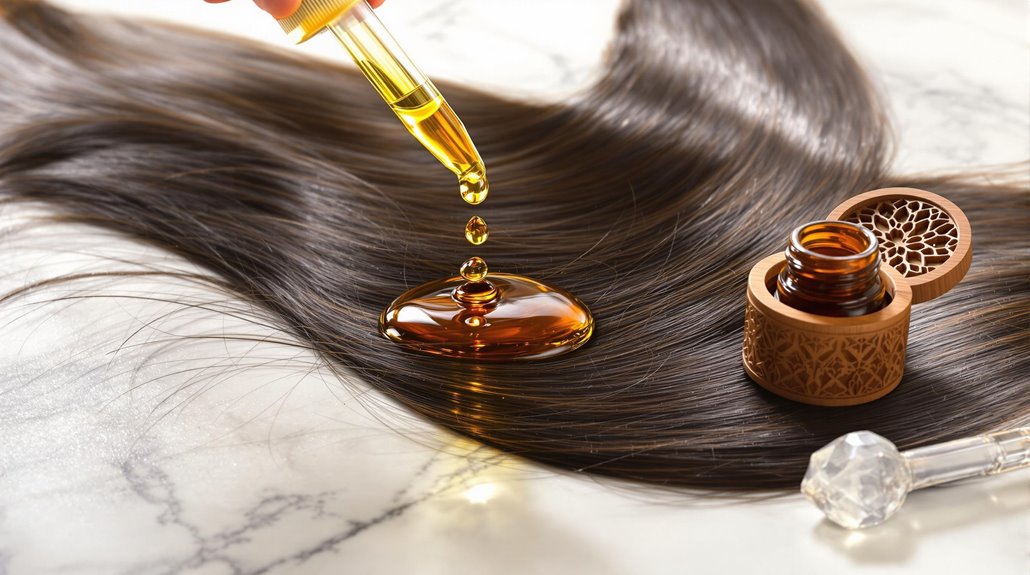
Now that you've prepared your sandalwood oil mixtures, proper application techniques will guarantee their benefits for your hair. The properties of sandalwood make it indispensable to apply the oil correctly to achieve the best results. When applying sandalwood with a carrier oil, focus on massaging it directly into your scalp to stimulate hair follicles and heighten circulation.
- Start with clean, slightly damp hair to help the oil penetrate better
- Section your hair into parts to ensure even distribution of the mixture
- Use your fingertips to gently massage the oil in circular motions
- Leave the treatment on for at least 30 minutes, or overnight for deeper conditioning
- Cover your hair with a warm towel to enhance absorption
Sandalwood oil can help reshape your hair care routine when applied consistently. The oil is effective when used 2-3 times per week, either as a pre-shampoo treatment or overnight mask. Remember that scalp stimulation is key - spend at least 5-10 minutes massaging the mixture into your roots. For best results, combine the oil with carriers like coconut or argan oil, maintaining a ratio of 5-10 drops of sandalwood per tablespoon of carrier oil.
Combining With Other Natural Ingredients
The versatility of natural hair care reaches new heights when you combine sandalwood oil with complementary ingredients. The Benefits of Sandalwood Oil are significantly amplified when you pair it with carrier oils like coconut, argan, or jojoba, creating a potent mixture that strengthens your hair and promotes growth.
You'll maximize results by incorporating sandalwood with other natural ingredients strategically. Try mixing it with honey or aloe vera in a hair mask for deep nourishment, taking advantage of their anti-inflammatory properties that soothe both skin and hair. For those concerned about hair loss, blend sandalwood oil with rosemary or peppermint essential oils to heighten circulation to your scalp.
When using sandalwood oil, you can create a luxurious serum by combining it with vitamin E and ceramides. This combination seals in moisture and reduces frizz effectively. For a thorough cleansing treatment, mix sandalwood powder with apple cider vinegar to create a clarifying rinse that removes buildup while maintaining your scalp's pH balance. These combinations guarantee you're getting the maximum benefits from each natural ingredient while addressing multiple hair care concerns simultaneously.
Choosing Quality Sandalwood Products
Selecting genuine sandalwood oil products requires careful attention to ingredient labels and sourcing methods. When shopping for high-quality sandalwood essential oil for your hair care routine, you'll want to verify that "santalum album" or "East Indian sandalwood oil" appears as the primary ingredient. The potency and effectiveness of your hair treatment depend on choosing organic, sustainably-sourced options that don't contain synthetic additives.
- Look for third-party testing certifications to confirm product authenticity
- Check the concentration of sandalwood oil in the formula
- Research the brand's sourcing practices and sustainability commitments
- Verify that the product is free from artificial fragrances
- Guarantee the packaging protects the oil from light and air exposure
Consider products that combine sandalwood oil benefits with other natural ingredients like argan oil or aloe vera for enhanced hair health. While quality sandalwood essential oil products might cost more, they're worth the investment for their superior results. Before making a purchase, read customer reviews and ratings to confirm the product's effectiveness and the manufacturer's reputation for maintaining high quality standards.
Hair Care Safety and Precautions
While choosing quality sandalwood products sets the foundation for effective hair care, proper safety measures guarantee you get the best results without unwanted side effects. Before experiencing the benefits of sandalwood oil's anti-inflammatory and antiseptic properties, you'll need to perform a patch test on a small area of skin to check for potential reactions.
When using sandalwood oil to promote healthier hair growth and skin cells, always dilute it with carrier oils like coconut or jojoba oil. This isn't just a suggestion - it's essential for preventing scalp irritation and ensuring the oil can be effectively absorbed. While sandalwood oil is commonly used in aromatherapy and hair care, excessive use can counteract its helpful properties and lead to unwanted dryness.
If you have any existing medical conditions, don't skip consulting with a dermatologist before incorporating sandalwood oil into your hair care routine. Watch for signs of irritation, redness, or adverse reactions during use. If you notice any unusual symptoms, stop using the product immediately and seek medical advice to help prevent any potential complications.

